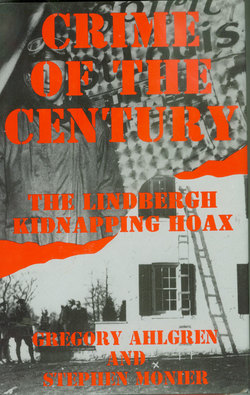Читать книгу Crime of the Century - Gregory Ahlgren and - Страница 3
На сайте Литреса книга снята с продажи.
PREFACE
ОглавлениеColonel Charles A. Lindbergh was one of the central figures of the American twentieth century. His solo flight from New York to Paris in May of 1927 did more than rivet the attention of the world.
Technologically, it granted aviation a respect previously absent. Historically, it altered America's geopolitical view. Never again could Americans feel safe behind an ocean which could be crossed by one man, alone, in 33 1/2 hours.
Lindbergh himself was transformed from a social misfit into America's greatest living hero. It mattered little that he was not the best pilot, nor that had he failed, others would have succeeded shortly thereafter. He had done it, and he would forever be "The Lone Eagle."
Accompanying his rise in social prominence was his rise in political stature. As the "Lone Eagle," Lindbergh was able to prevail in a clash with Franklin Roosevelt over issues concerning the federal regulation of airlines, and even for a time, over American foreign policy.
When in 1929, he married the young Anne Morrow, daughter of Ambassador Dwight Morrow, the press and the public treated the couple as the Europeans might royalty. They were hounded by paparazzi.
The 1932 disappearance of their infant son shocked and outraged the nation. When the child's body was discovered, other parents actually wrote to the Lindberghs offering their own children as substitutes.
Beyond the glitz and the grief, however, a darker side of Lindbergh was never exposed. His beliefs on racial superiority were not generally known by the adoring public. The cruel behaviors he often directed at those close to him were given scant attention.
More than two years after the child's death Bruno Richard Hauptmann was arrested and convicted of the murder. In 1935, shortly before Hauptmann's scheduled execution, the New Jersey governor announced that several troubling aspects of the case compelled him to reopen the investigation. Lindbergh secretly slipped away to Europe with his family.
There he became openly proNazi, often visiting Germany and even accepting an aviation award from Hermann Goering.
Upon his return to America in 1939 Lindbergh became politically outspoken. As the de facto leader of the America First Movement, he advocated total neutrality in World War II. He was openly proGerman and proNazi, and in his speeches, made no effort to mask his strong anti Semitism.
Recognizing the threat posed by a Nazi dominated Europe, President Franklin Roosevelt emerged as the leader of the internationalist forces; Lindbergh the spokesman for isolationism. Although his popularity declined, Lindbergh's position came close to prevailing. That it did not, was attributable to military developments beyond his control.
In the postwar euphoria, Lindbergh's antebellum stance was swept from the nation's consciousness. What remained were the twin images of "Lucky Lindy," crossing the Atlantic alone and brave, and, to a lesser extent, the tragedy of the loss of his first child. This book explores his role in that tragedy.
